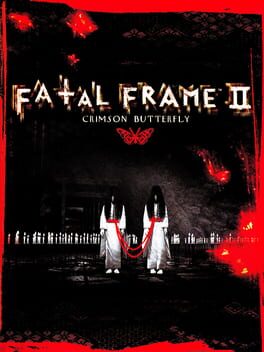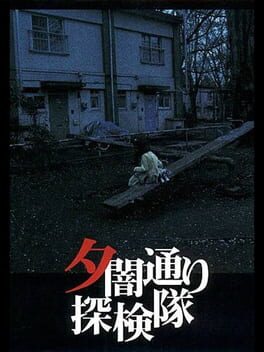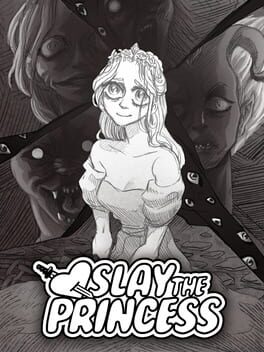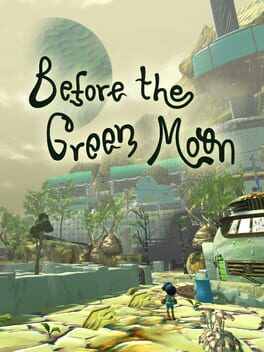keatsian
Favorite Games
002
Total Games Played
000
Played in 2024
000
Games Backloggd
Recently Reviewed See More
Full disclosure, I'm currently compelled to come back to this and problematize it some more. My initial ability to consider it was tainted by the fact that I found its narrative style obnoxious (still do lol), and so after my first full playthrough I dropped it. Not because I thought it sucked, but because I needed the time away from it to mull over the things it's saying and doing in a more objective way, and during that time I found that those things were at least worth exploring again in a replay. I've since completed two more playthroughs, the second played on mute and the third played as-is, and while I think there's still some stuff I've yet to put together and there's some other stuff I've put together that I want to demolish so I can reassemble them in new ways, I think what I've currently processed is enough to log this version of it.
Since I've already brought it up, let's start with the narrative style. First of all, it's so annoying. Like really. I know I already brought that up but I had to make sure it was mentioned in the review proper, and now that it has been I can let it go. It's just a personal quibble, no biggie, we can move on. Second, I've settled on the narrative style being both additive and diminishing, though to the game's credit more of the former. The metatextual slant really does much in fleshing out the principal characters involved and the voice acting does much to concretize the player's shifting impressions on the story as it also continues to twist and turn. That the Narrator and the multiple voices can't help wrestle with you and with one another when you do so much as inspect a thought is a well-considered take on challenging authorial agencies and vying for narrative participation/control, even if I think it ultimately doesn't go far enough with it. In a word, it readies you, such that you can better gauge what might change if you pick up the blade again, if you ignore it this time, if you slay the princess again, if you save her this time. The diminishing parts stem from the fact that this kind of approach can overly tell even when it just means to show, and that's exactly what happened here at times. I feel like there's always an inherent unsaid conversation between the player and the player character and between the player and the game when choice-making is involved, and I feel that that conversation was often superseded by how Slay the Princess's chattiness either anticipated your interpretations, or outright did them for you (why would you do that?!). For as imaginative as the game was in reacting to your choices and crystallizing them into truly wonderful routes, it was sometimes equally as hasty in signposting what they might be about or how they might be perceived. Even when it tried to be cute, tried to play coy, tried to obscure itself in meta, it couldn't help but wear its explicating heart on its sleeve. The best routes weren't immune from this. Even Thorn couldn't help but wink at you on what the vines might have signified. Even Moment of Clarity couldn't help but nudge you towards what's beneath the larger story's mask. That's to say nothing of the charming but rather one-note peckings of the Narrator.
It wouldn't be so bad if the agency which informed the obviousness shifted as the story shifted, if it was performing or was going to perform something else other than be obvious or reiterative. But it never quite does that. While some routes hint at, or even outright reveal, that there is something larger at play here, they never really factor in the mechanical participation of where the story might go. You can get something like Thorn or the Wild very early in your run, and I'd argue that you shouldn't be able to. They feel too climactic and should therefore be exclusively found in the late game. Getting them early paints a prematurely clear picture of what story the game is telling, something that I found frustrating because you really can't do anything with that knowledge. Instead, you'll be forced to do subsequent routes that will most likely regurgitate the same themes and the same sentiments but won't express them as eloquently.
I get why you couldn't be too influential of course. Slay the Princess does outline its reasons for that. But I don't know. As sensible as the reasoning was, I also found it to be impositional. The carving of more perspectives is engaging because there is an excitement to seeing what kind of princess you'll be entangled with next, but from the panoramic view they never really coalesce into a satisfying whole. They're barely in dialogue with each other outside of the yin-yang "bound to each other's fates" thing that the game continually prompts but never really deepens. The love story never feels momentous as a result. Even the denouement gets hampered. Rather than an elegant synthesis of everything the game wanted to explore, it is instead just an elegant extended cut of what your very first loop might have already expressed, of what your second one definitely did. In Slay the Princess, everything is deferral. And then it just ends.
I don't mean to be too harsh on this game. No other game this year made me want to teeter more on its narrative and conceptual edges. It's just that, the more I did that, the less I was rewarded. It is a very professionally-presented game. The reactivity to player choice is outstanding. The sheer amount of illustrations is kind of insane and I love looking at the game. The routes are imaginative and I'd even say that they're genuinely poetic. But they really only worked for me in isolation, as haiku, as self-contained musings on the game's ideas and themes. When they became vignettes to a larger picture that couldn't quite hold up is when the game lost me. It became a collection of short stories that were less resonantly echoing of each other and more repetitively echoing of what another had just said.
As I've mentioned, I do intend to explore this game further. I'll definitely be there for the Pristine Cut. But as of now, I find that it is a game that was not successful in paying off the things it set up. On the other hand, it is sublime in the moment-to-moment. It is to me, then, to quote Louise Gluck, a game that "makes no forms but twisted forms": Always gesturing but not always gestural. Eloquent but not necessarily evocative. Some most exquisite features of a quite inexquisite corpse. I suppose I have to take the bad with the good, then. That's what it means to love.
Since I've already brought it up, let's start with the narrative style. First of all, it's so annoying. Like really. I know I already brought that up but I had to make sure it was mentioned in the review proper, and now that it has been I can let it go. It's just a personal quibble, no biggie, we can move on. Second, I've settled on the narrative style being both additive and diminishing, though to the game's credit more of the former. The metatextual slant really does much in fleshing out the principal characters involved and the voice acting does much to concretize the player's shifting impressions on the story as it also continues to twist and turn. That the Narrator and the multiple voices can't help wrestle with you and with one another when you do so much as inspect a thought is a well-considered take on challenging authorial agencies and vying for narrative participation/control, even if I think it ultimately doesn't go far enough with it. In a word, it readies you, such that you can better gauge what might change if you pick up the blade again, if you ignore it this time, if you slay the princess again, if you save her this time. The diminishing parts stem from the fact that this kind of approach can overly tell even when it just means to show, and that's exactly what happened here at times. I feel like there's always an inherent unsaid conversation between the player and the player character and between the player and the game when choice-making is involved, and I feel that that conversation was often superseded by how Slay the Princess's chattiness either anticipated your interpretations, or outright did them for you (why would you do that?!). For as imaginative as the game was in reacting to your choices and crystallizing them into truly wonderful routes, it was sometimes equally as hasty in signposting what they might be about or how they might be perceived. Even when it tried to be cute, tried to play coy, tried to obscure itself in meta, it couldn't help but wear its explicating heart on its sleeve. The best routes weren't immune from this. Even Thorn couldn't help but wink at you on what the vines might have signified. Even Moment of Clarity couldn't help but nudge you towards what's beneath the larger story's mask. That's to say nothing of the charming but rather one-note peckings of the Narrator.
It wouldn't be so bad if the agency which informed the obviousness shifted as the story shifted, if it was performing or was going to perform something else other than be obvious or reiterative. But it never quite does that. While some routes hint at, or even outright reveal, that there is something larger at play here, they never really factor in the mechanical participation of where the story might go. You can get something like Thorn or the Wild very early in your run, and I'd argue that you shouldn't be able to. They feel too climactic and should therefore be exclusively found in the late game. Getting them early paints a prematurely clear picture of what story the game is telling, something that I found frustrating because you really can't do anything with that knowledge. Instead, you'll be forced to do subsequent routes that will most likely regurgitate the same themes and the same sentiments but won't express them as eloquently.
I get why you couldn't be too influential of course. Slay the Princess does outline its reasons for that. But I don't know. As sensible as the reasoning was, I also found it to be impositional. The carving of more perspectives is engaging because there is an excitement to seeing what kind of princess you'll be entangled with next, but from the panoramic view they never really coalesce into a satisfying whole. They're barely in dialogue with each other outside of the yin-yang "bound to each other's fates" thing that the game continually prompts but never really deepens. The love story never feels momentous as a result. Even the denouement gets hampered. Rather than an elegant synthesis of everything the game wanted to explore, it is instead just an elegant extended cut of what your very first loop might have already expressed, of what your second one definitely did. In Slay the Princess, everything is deferral. And then it just ends.
I don't mean to be too harsh on this game. No other game this year made me want to teeter more on its narrative and conceptual edges. It's just that, the more I did that, the less I was rewarded. It is a very professionally-presented game. The reactivity to player choice is outstanding. The sheer amount of illustrations is kind of insane and I love looking at the game. The routes are imaginative and I'd even say that they're genuinely poetic. But they really only worked for me in isolation, as haiku, as self-contained musings on the game's ideas and themes. When they became vignettes to a larger picture that couldn't quite hold up is when the game lost me. It became a collection of short stories that were less resonantly echoing of each other and more repetitively echoing of what another had just said.
As I've mentioned, I do intend to explore this game further. I'll definitely be there for the Pristine Cut. But as of now, I find that it is a game that was not successful in paying off the things it set up. On the other hand, it is sublime in the moment-to-moment. It is to me, then, to quote Louise Gluck, a game that "makes no forms but twisted forms": Always gesturing but not always gestural. Eloquent but not necessarily evocative. Some most exquisite features of a quite inexquisite corpse. I suppose I have to take the bad with the good, then. That's what it means to love.
I thought I had this game figured out before I even played it. Harvest Green Moon: Friends from a Ghost Town. Self-cultivation via land cultivation. “The only thing that’s actually still growing is capitalism.” (Necro)pastoral mono no aware. The expectation that you’ll know the exact moment when you have to trigger the ending, even if you still kind of want more, or still want to linger so badly, because Turnfollow. In the end, it’s all these things, anyway, and it offers much to essay about one or all these angles.
But no, after another run with it, I think the angle that’s illuminating new things for me, the one that’s turning my initial approval for it into something closer to affection, is the angle that frames this game as a game that wants to explore desire. About desire clarifying itself, contradicting itself, configuring and being reconfigured, settling in, being settled, being satisfied, yet also being stirred to uneasiness, often by itself, being relinquished finally. Most of all it’s a game about desire being unfurled from material considerations, poured out of specifically-shaped receptacles, allowed to insist and to persist and to chance upon an individual more ethereally.
Because yes, your initial goal and your ultimate goal are the same: you want to earn enough scrip so you can buy a ticket to the moon. And yes, this game only has one ending, and it involves you accomplishing that goal. But be that as it may, you’re not really going to spend much of your playtime with this goal in mind. Rather, you’ll be spending much of your playtime being a member of a peculiar community: being served meals by a cook who wants no compensation of any kind, hanging out with a kid who introduced themselves by saying they don’t trust farmers, falling in love with someone who was so sure that she was going to leave, and that she was going to leave soon. Yet she’s still here. And the time she has outside of work is usually spent with you.
Putting it like that, it sounds like the game is making you consider the possibility of staying, that the moon isn’t the only place for you, that where you currently are might even be the better option. It even externalizes this through the characters. Carol remarks that you’ve become a great fit for the community. Marshall is observed as being worried about what will happen to you in the future. Pony practically begs you to stay, even as she tries to obscure it in distantiating language. All this, even as they anticipate your future departure. It was inevitable, of course, for me to weigh this heavily on my mind. Do I stay or do I go? Do I convince Pony to go with me if I do go (I eventually find out that wasn’t even an option)? It was already emotional for me to pass by the area where the Moon Elevator was located on a rainy evening. To do nothing and just take that moment in as both the music and the rain swelled, to let the game run until it transported me back to my room. It became all the more wistful as this town started to become more like a home.
And yet, as felt as this aspect was for me, much of my fascination with Before the Green Moon isn’t even here exactly, in this idea that it’s making you choose between two places. Instead, it’s in the idea that it’s problematizing what a place even is. It’s a game that’s interested in the liminal: a ghost town that grows life for the moon, abandoned yet needed, place and placelessness, a community where a member is both stranger and friend, living to work and working to live, scrip for today and scrip for the future, permanence and lastingness, something out of nothing, everything despite nothing, what is now and what is awaiting, even if they might end up being one and the same. The characters are conditioned by this, of course. Maria considers this a perfect place for her, though she sometimes wishes she could travel. In one of her key scenes, she shares that she came from an island that no longer exists. You ask her if leaving was the right choice, and she simply answers she doesn’t know. Int, meanwhile, seems to always be informed by where he ought to be. He is working on this thing because it will bring him there, he is heeding the words of his Granny because she will bring him there. Yet later on, without any real climactic event that you can pinpoint and say, “Yes, this is where everything changed for him,” he says something like, “I’m a different person now. Are you a different person too?” These people are currently living lives here, and the game never declares if they’re the lives they should be living or if they had lives they didn’t get to live, only that these are their lives now, and while their pasts may point to something that was lost or something that was foundational, what is here is what is the now and the currently happening.
The whole game behaves this way. It hints at current experiences textured by what was, but it's not clutching onto the past, instead sets it aside so that what will be can be in a community like this. Even the things that are really just there to mechanically convenience the player seem to be pointing towards something. You have a dwelling, but you can sleep anywhere where there’s a bench and no one will chastise you for it. There are shelves in places where you don’t expect them, and you can use them for storage. Who set them up? To whom do they belong now? To no one and to everyone, of course. This is a country without a flag.
The game only has one ending, and it involves you going to the moon. Yet despite that knowledge, it seems to invite you to stay instead. Why is it doing that? And why doesn't it just make it easier for me by framing it as a binary choice, where I can just choose the Moon ending or the Town one? Is it making me ask what it is that I really want, making me examine what it is that makes something important to me? Is it making me purify my intentions, by making me question if there is something postponing for, if staying for a bit longer is even postponement? Is that why there’s this otherworldly moon lore that the game refuses to elaborate upon but nonetheless drip feeds you with, at one point shoves in your face? Does that have a thread I can follow to a tangible end? Does a formalized tangibility even matter at all, or is it enough if all this is just presenting a metagaming angle, one that allows me to write an ending for myself, and which can feel as equally realized as the only real, which is to say official, ending? I still don’t know. Maybe I can’t know. Maybe both the game and I knew from the start that it was not for me to be able to know. It’s disconcerting in its uncertainty yet I’m driven to wonder. That’s desire, baby.
But no, after another run with it, I think the angle that’s illuminating new things for me, the one that’s turning my initial approval for it into something closer to affection, is the angle that frames this game as a game that wants to explore desire. About desire clarifying itself, contradicting itself, configuring and being reconfigured, settling in, being settled, being satisfied, yet also being stirred to uneasiness, often by itself, being relinquished finally. Most of all it’s a game about desire being unfurled from material considerations, poured out of specifically-shaped receptacles, allowed to insist and to persist and to chance upon an individual more ethereally.
Because yes, your initial goal and your ultimate goal are the same: you want to earn enough scrip so you can buy a ticket to the moon. And yes, this game only has one ending, and it involves you accomplishing that goal. But be that as it may, you’re not really going to spend much of your playtime with this goal in mind. Rather, you’ll be spending much of your playtime being a member of a peculiar community: being served meals by a cook who wants no compensation of any kind, hanging out with a kid who introduced themselves by saying they don’t trust farmers, falling in love with someone who was so sure that she was going to leave, and that she was going to leave soon. Yet she’s still here. And the time she has outside of work is usually spent with you.
Putting it like that, it sounds like the game is making you consider the possibility of staying, that the moon isn’t the only place for you, that where you currently are might even be the better option. It even externalizes this through the characters. Carol remarks that you’ve become a great fit for the community. Marshall is observed as being worried about what will happen to you in the future. Pony practically begs you to stay, even as she tries to obscure it in distantiating language. All this, even as they anticipate your future departure. It was inevitable, of course, for me to weigh this heavily on my mind. Do I stay or do I go? Do I convince Pony to go with me if I do go (I eventually find out that wasn’t even an option)? It was already emotional for me to pass by the area where the Moon Elevator was located on a rainy evening. To do nothing and just take that moment in as both the music and the rain swelled, to let the game run until it transported me back to my room. It became all the more wistful as this town started to become more like a home.
And yet, as felt as this aspect was for me, much of my fascination with Before the Green Moon isn’t even here exactly, in this idea that it’s making you choose between two places. Instead, it’s in the idea that it’s problematizing what a place even is. It’s a game that’s interested in the liminal: a ghost town that grows life for the moon, abandoned yet needed, place and placelessness, a community where a member is both stranger and friend, living to work and working to live, scrip for today and scrip for the future, permanence and lastingness, something out of nothing, everything despite nothing, what is now and what is awaiting, even if they might end up being one and the same. The characters are conditioned by this, of course. Maria considers this a perfect place for her, though she sometimes wishes she could travel. In one of her key scenes, she shares that she came from an island that no longer exists. You ask her if leaving was the right choice, and she simply answers she doesn’t know. Int, meanwhile, seems to always be informed by where he ought to be. He is working on this thing because it will bring him there, he is heeding the words of his Granny because she will bring him there. Yet later on, without any real climactic event that you can pinpoint and say, “Yes, this is where everything changed for him,” he says something like, “I’m a different person now. Are you a different person too?” These people are currently living lives here, and the game never declares if they’re the lives they should be living or if they had lives they didn’t get to live, only that these are their lives now, and while their pasts may point to something that was lost or something that was foundational, what is here is what is the now and the currently happening.
The whole game behaves this way. It hints at current experiences textured by what was, but it's not clutching onto the past, instead sets it aside so that what will be can be in a community like this. Even the things that are really just there to mechanically convenience the player seem to be pointing towards something. You have a dwelling, but you can sleep anywhere where there’s a bench and no one will chastise you for it. There are shelves in places where you don’t expect them, and you can use them for storage. Who set them up? To whom do they belong now? To no one and to everyone, of course. This is a country without a flag.
The game only has one ending, and it involves you going to the moon. Yet despite that knowledge, it seems to invite you to stay instead. Why is it doing that? And why doesn't it just make it easier for me by framing it as a binary choice, where I can just choose the Moon ending or the Town one? Is it making me ask what it is that I really want, making me examine what it is that makes something important to me? Is it making me purify my intentions, by making me question if there is something postponing for, if staying for a bit longer is even postponement? Is that why there’s this otherworldly moon lore that the game refuses to elaborate upon but nonetheless drip feeds you with, at one point shoves in your face? Does that have a thread I can follow to a tangible end? Does a formalized tangibility even matter at all, or is it enough if all this is just presenting a metagaming angle, one that allows me to write an ending for myself, and which can feel as equally realized as the only real, which is to say official, ending? I still don’t know. Maybe I can’t know. Maybe both the game and I knew from the start that it was not for me to be able to know. It’s disconcerting in its uncertainty yet I’m driven to wonder. That’s desire, baby.






